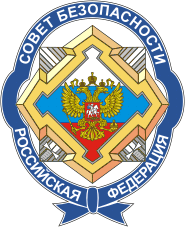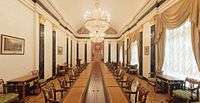Security Council of Russia

 |
| This article is part of a series on the politics and government of Russia |
The Security Council of the Russian Federation (SCRF) (Russian: Совет Безопасности Российской Федерации) is a consultative body of the Russian President that works out the President's decisions on national security affairs. Composed of key ministers and agency heads and chaired by the President of Russia, the SCRF was established to be a forum for coordinating and integrating national security policy. It is the successor of the Security Council of the USSR.
History
Since its formation, it apparently has gradually lost influence in competition with other power centers in the presidential administration. However, the June 1996 appointment of former army general and presidential candidate Alexander Lebed to head the Security Council improved prospects for the organization's standing. In July 1996, a presidential decree assigned the Security Council a wide variety of new missions. The decree's description of the Security Council's consultative functions was especially vague and wide-ranging, although it positioned the head of the Security Council directly subordinate to the president. As had been the case previously, the Security Council was required to hold meetings at least once a month.
After President Medvedev removed Yuri Baluyevskiy as chief of the General Staff and appointed him to the Security Council, several Russian analysts suggested that the Security Council was a sinecure for military and security officials on their way to retirement. Its limited role also may have been indicated during the 2008 South Ossetia war, when the Security Council met on the second day of warfare, after Medvedev had already directed the engagement of Russian forces against Georgia.[1]
Role

The Security Council draws up crucial documents defining conceptual approaches to national security. Regular meetings of the Security Council are held according to a schedule set by the Chairman (the President of Russia); if necessary, the Council can hold extraordinary meetings. The Chairman defines the agenda and order of the day based on recommendations by the Secretary of the Security Council. The Chairman presides over meetings, while the Secretary holds working meetings with Council members on a regular basis.
It has been argued that the coordinating role defined for the Security Council in the National Security Strategy to 2020,[2] published in May 2009, represents a strengthening of its influence and importance within Russian governance under its new Secretary Nikolay Patrushev.[3]
A Presidential decree on the Security Council issued by President Medvedev in early May 2011 appeared to strengthen the role of the presidential administration in overseeing military affairs. The edict clarified that the Security Council examines issues and prepares "presidential decisions" on the "organization of defense, military organizational development, defense production, and military and military-technical cooperation of Russia with foreign states",[4] as well as the formulation and implementation of foreign policy, and the monitoring of public expenditure on defence, national security and law enforcement. The Secretary will also make proposals to the Secretary Council for coordinating the work of federal and regional executive bodies in national emergencies.[5]
Composition
As of 2016
| Name | Post |
|---|---|
| Vladimir Putin | President of Russia, Chairman of the Security Council |
| Dmitry Medvedev | Prime Minister of Russia |
| Valentina Matviyenko | Chairwoman of the Federation Council |
| Vyacheslav Volodin | Chairman of the State Duma |
| Anton Vaino | Chief of Staff of the Presidential Executive Office |
| Nikolai Patrushev | Secretary of the Security Council |
| Rashid Nurgaliyev | Deputy Secretary of the Security Council |
| Sergei Shoigu | Minister of Defence |
| Sergey Lavrov | Minister of Foreign Affairs |
| Vladimir Kolokoltsev | Minister of Internal Affairs |
| Viktor Zolotov | Director of the National Guard |
| Sergey Naryshkin | Director of the Foreign Intelligence Service |
| Alexander Bortnikov | Director of the Federal Security Service |
Secretaries of the Security Council
- Yury Skokov (1992–1993)
- Yevgeny Shaposhnikov (1993)
- Oleg Lobov (1993–1996)
- Aleksandr Lebed (1996)
- Ivan Rybkin (1996–1998)
- Andrei Kokoshin (1998)
- Nikolai Bordyuzha (1998–1999)
- Vladimir Putin (1998–1999)
- Sergei Ivanov (1999–2001)
- Vladimir Rushailo (2001–2004)
- Igor Ivanov (2004–2007)
- Valentin Sobolev (2007 – 12 May 2008)
- Nikolai Patrushev[6] (since 12 May 2008)
References
- ↑ Russian Military Reform and Defense Policy
- ↑ Text of the Strategy in English
- ↑ Review of National Security Strategy to 2020 by Keir Giles, NATO Defense College
- ↑ Russian Military Reform and Defense Policy
- ↑ "The 2012 Presidential Elections in Russia: What Future for the Medvedev-Putin Tandem?"
- ↑ Russia trolls world by saying it cannot stop its citizens from fighting in Ukraine, Kyiv Post (25 June 2015)
External links
| Wikimedia Commons has media related to Security Council. |